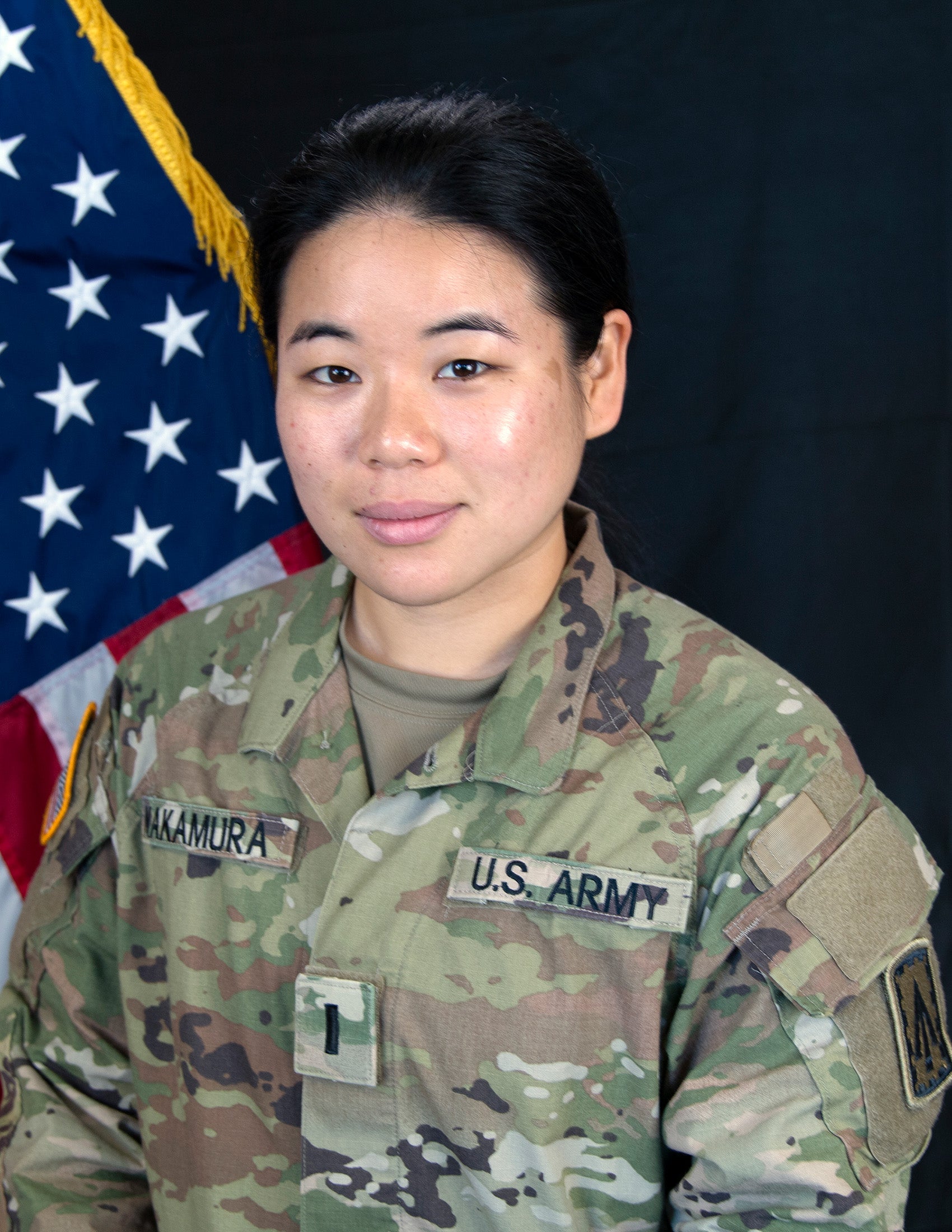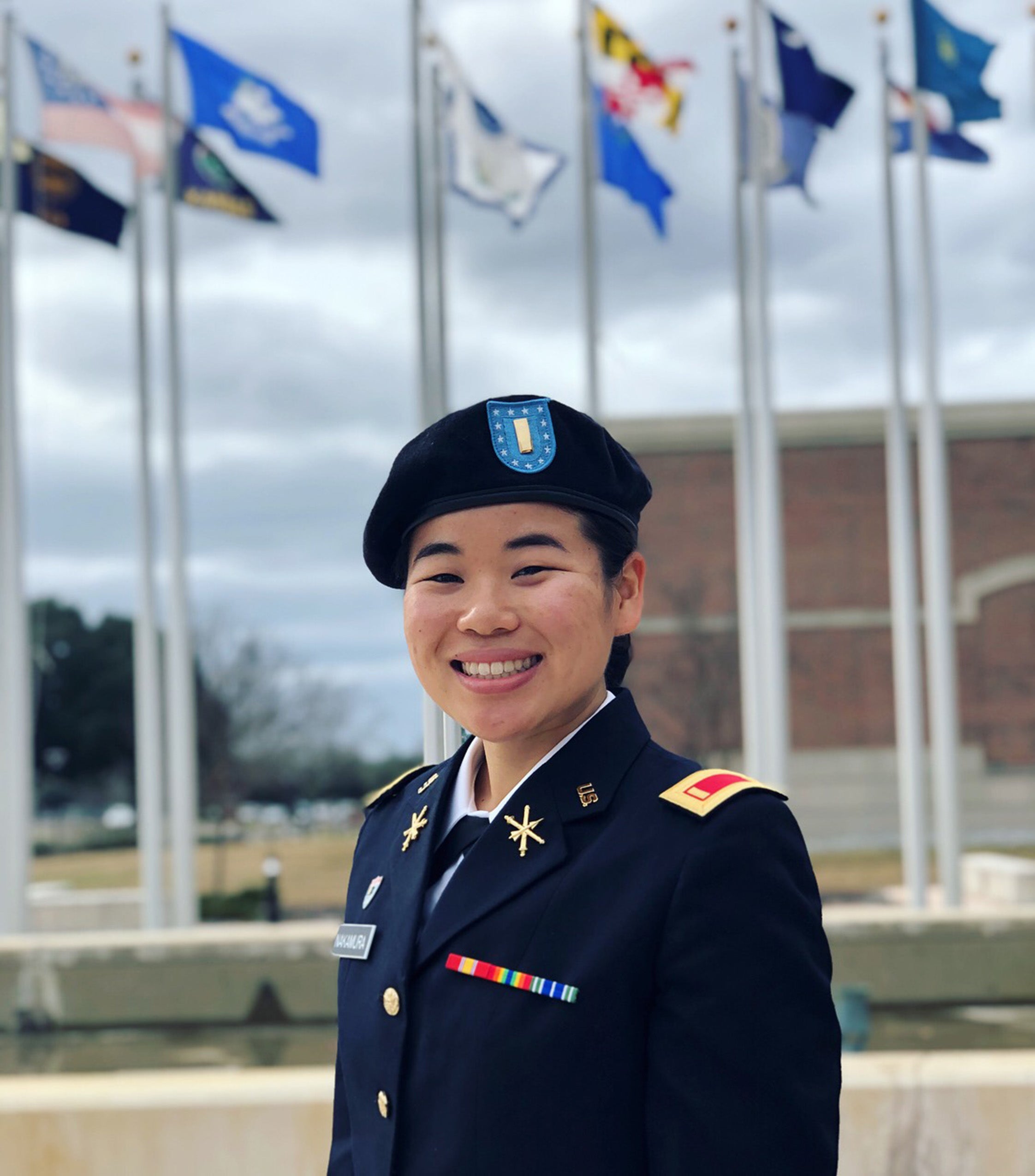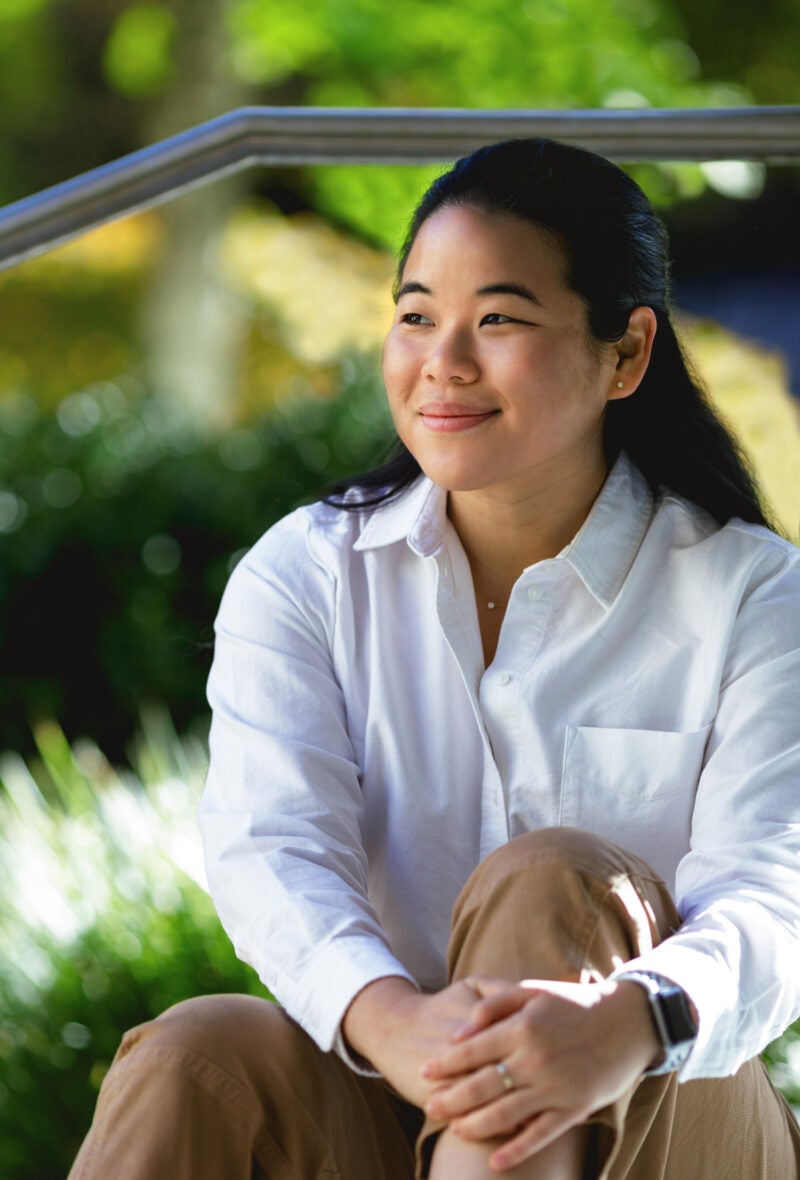Casey Nakamura ’25 always planned to go to law school. But first she wanted to take a few years off to “do something interesting,” as she’d been advised by lawyers in the office of U.S. Senator Mazie Hirono of Hawaii, where she’d interned during her undergraduate studies at Boston University. During a semester abroad in Israel — where she became proficient in Arabic — Nakamura met women soldiers in the Israeli Defense Forces, and as she contemplated post-college choices, she felt inspired to enlist in the U.S. Army.
But Nakamura was weighing this decision in 2016, during a particularly polarized U.S. presidential election in which strong elements of racism and sexism surfaced across the nation.
“When it feels like your country really doesn’t like you and the things you feel it stands for are not being manifested, is that the time to pull away or lean in?” Nakamura recalls asking herself. Her family history provided the guidance she needed. Born and raised in Hawaii, Nakamura had relatives who’d been forced into internment camps during World War II and others who served in the storied 442nd Regimental Combat Team, a segregated Japanese American unit that, accounting for size and duration, was the most decorated in U.S. military history.

“Obviously it’s not the same thing at all, but I thought about them a lot,” says Nakamura. Despite the unjust internment of their relatives, “Japanese Americans [during World War II] really leaned into what the country stands for. They proved their commitment to their country and the values America stood for.” It sealed her choice to enlist.
After graduating from Boston University, where she double majored in international relations and Middle East and North Africa studies, Nakamura headed to basic training in Fort Jackson, South Carolina, then Officer Candidate School in Fort Benning, Georgia. Commissioned in the Air Defense Artillery school, she headed to Camp Carroll, South Korea, where she managed training for 38 soldiers in a Patriot Missile System platoon. After leading the platoon to four successful certifications in air defense gunnery, she ranked first among 16 second lieutenants in her unit.
“I loved it,” recalls Nakamura, who spent three-and-a-half years in the Army. The mission of air defense artillery “is to defend a strategic asset. When you’re in Korea, that means you’re defending civilians a lot of the time, since their strategic assets are in big cities. To know we worked so hard every day, so that if we went to war so many innocent people would be protected, was very exciting.”
After 13 months in Korea, Nakamura was stationed in Fort Bragg, North Carolina, as an executive officer responsible for daily operations of the largest air defense battery in the U.S. Army Forces Command, including management of 186 soldiers. Rated in the top 10 percent of all officers in the unit, Nakamura was personally selected to serve as battalion adjutant by the commander of the largest air defense battalion in the 32nd Army Air and Missile Defense Command. Responsible for the training and wellbeing of more than 850 soldiers, she felt a strong sense of purpose in protecting them. “We exist to fight and win the nation’s wars, but you can’t do that if you’re not taking care of your people at the end of the day,” she says.
Despite a generally “very positive” military experience, when the COVID-19 pandemic erupted in 2020, Nakamura was dismayed to encounter anti-Asian sentiments, including among some of her own soldiers. And it was in the Army, for the first time in her life, that she experienced explicit sexism.
“At the end of the day, the evidence is there that women can perform — and outperform men a lot of the time.”
“I was really lucky; I didn’t experience any sort of sexual harassment,” she recalls. “It was a lot more about people saying, ‘Women don’t belong in the Army’ or ‘I don’t want women on my team.’” Although “unpleasant,” she says, “it was also really funny to me, because I found the only men who made that kind of comment were not high performers. I found that the high performers, as long as you also were a high performer, too, wanted you on the team.”
The officers for whom she worked fully supported her, and the critics “never got to positions of power and influence” so they “never really affected my opportunities.” Noting that the Army is about 20 to 25 percent women, Nakamura adds, “I think at the end of day the evidence is there that women can perform — and outperform men a lot of the time.”
While she served, the Army made significant changes to its uniform standards for women, allowing them to wear their hair in ponytails or braids instead of buns and to paint their fingernails, in neutral colors. “There were a lot of comments, ‘How will we beat Russia?’” she recalls, laughing. Though Nakamura preferred her hair in a bun and had never enjoyed painting her nails, she began sporting the newly permitted hairstyles as well as nail polish. “I did it so the soldiers under me would know it was okay and so the people complaining would not take it out on women with lesser rank,” she says. After “literally a month or two,” she recalls, “no one cared.” She laughs and adds, “That was just another fun little gender thing.”
Though she seriously considered reenlisting after her commitment ended, military service often means choosing between family and the needs of her soldiers, so Nakamura decided to instead pursue her dream of legal training.
“I loved my time in the Army. … The leadership opportunities it provides, especially at that young age, are really hard to find in the civilian world.”
Because so many of her college friends are still in Boston, Nakamura applied to Boston-area law schools. She chose Harvard Law School, she says, because of its support for veterans. “Harvard Law School, by far, has the most robust and responsive programs for veterans,” Nakamura says. The admissions office offers many resources, “and all the students I talked to who were vets were really friendly, even when you were still in the application process. I felt I would be really comfortable here and that’s definitely been the case.” The cost of her legal education is covered entirely by the GI Bill combined with Harvard Law’s participation in the Yellow Ribbon Program, which helps fund veterans’ tuition and expenses.
Just a few months into her first year of law school, Nakamura has no specific career goals yet although she’s interested in public service and eventually wants to return to Hawaii, where her uncle, Edward H. Nakamura, who served in the storied 442nd during World War II, was a justice on the state supreme court.
Overall, she says, “I loved my time in the Army. It was a really positive experience and I wish more young women would consider it. The leadership opportunities it provides, especially at that young age, are really hard to find in the civilian world. It gives you a level of confidence and leadership skills that are really hard to find anywhere else.”

